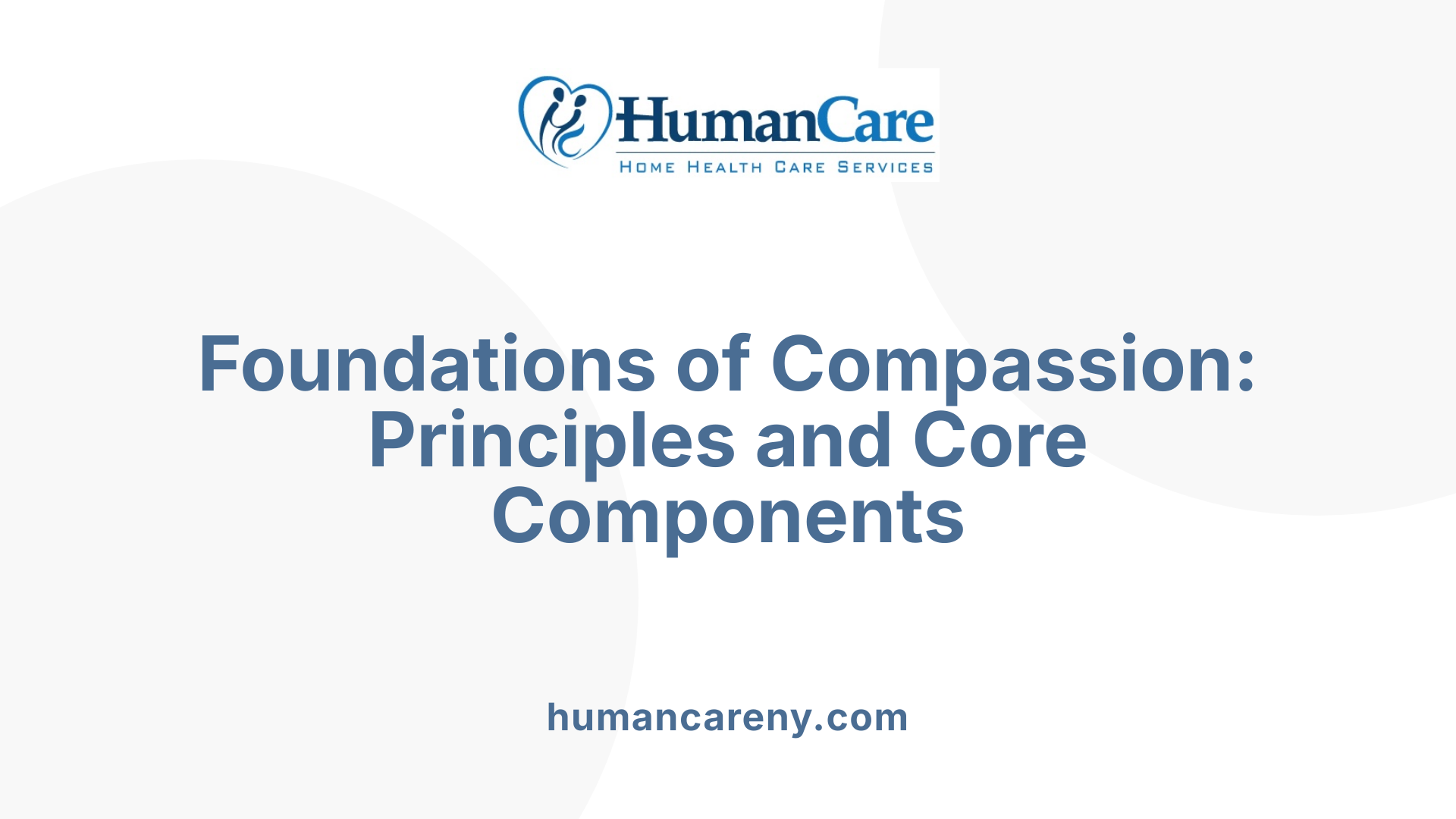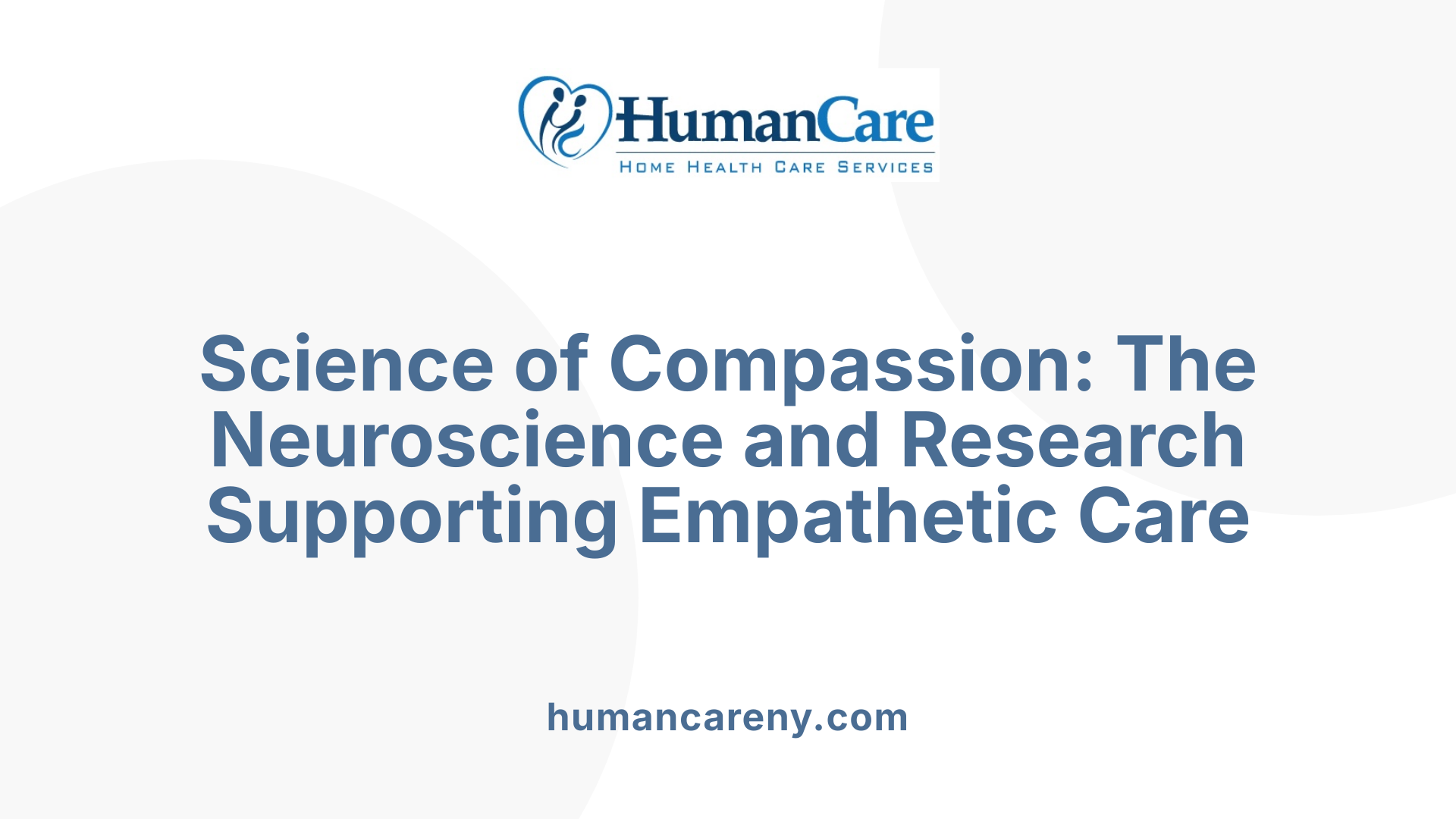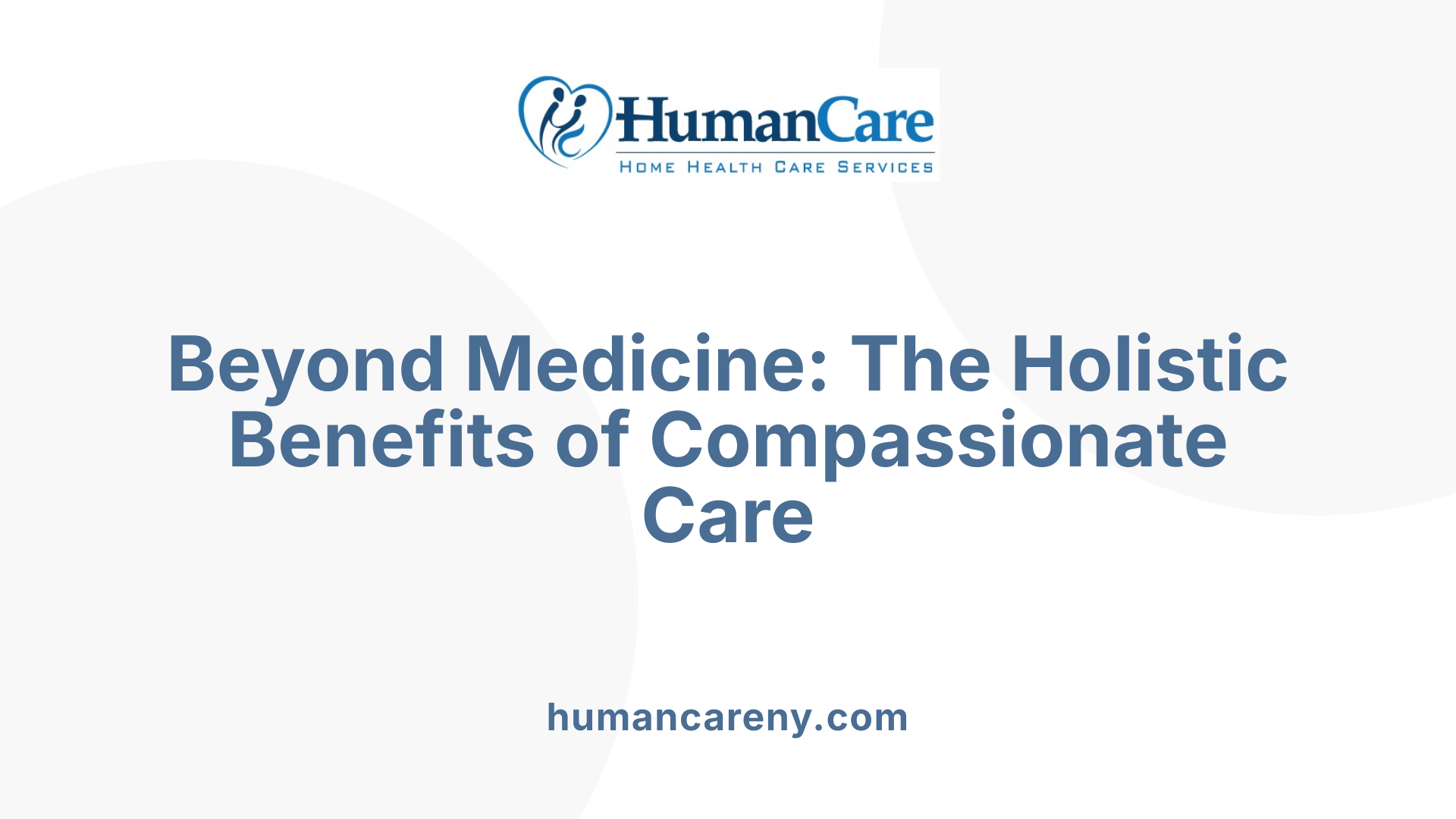Understanding Compassionate Care and Its Fundamental Role in Recovery
Compassionate care is recognized as a cornerstone of effective healthcare, emphasizing empathy, respect, and emotional support alongside medical treatment. Its significance extends beyond immediate healing to fostering trust, safety, and resilience—elements vital for long-term recovery and overall well-being. This article explores the vital components, benefits, scientific underpinnings, and practical applications of compassionate care in diverse healthcare settings.
Principles and Core Components of Compassionate Care

What are the principles of compassionate care?
Compassionate care is rooted in several fundamental principles that guide healthcare professionals in providing empathetic and respectful support to patients. These core elements include trust, dignity, respect, effective communication, and collaboration with patients and their families.
Trust is essential in building a safe environment where patients feel confident to share their worries and treatment preferences. When healthcare providers consistently demonstrate honesty, transparency, and reliability, they foster a trusting relationship that encourages open dialogue.
Maintaining patient dignity involves respecting their personal values, beliefs, and choices. This means acknowledging their emotional, psychological, and social needs alongside medical treatment.
Respect plays a vital role in recognizing each patient's unique situation and preferences. It guides providers to approach care with sensitivity, ensuring that patients feel valued and understood.
Effective communication is at the heart of compassionate interactions. Listening actively, explaining treatment options in understandable terms, and demonstrating genuine interest are actions that reinforce compassion.
Finally, collaboration involves working alongside patients and their families, respecting their input, and involving them meaningfully in decision-making. This holistic approach ensures that care is tailored to individual needs and fosters a sense of partnership.
Together, these principles form the foundation of compassionate healthcare, promoting healing, trust, and a positive patient experience.
For further exploration, searching 'principles of compassionate healthcare' can provide additional insights into best practices and emerging approaches in this vital aspect of care.
Empirical Evidence and Key Components of Compassion in Practice

What are the benefits and components of compassionate care in healthcare practices?
Compassionate care is a cornerstone of quality healthcare, rooted in the ability to recognize and understand a patient's suffering, coupled with the desire to ease it. This approach emphasizes empathy, respect, and emotional support to foster trust and promote healing.
Research shows that compassionate healthcare leads to numerous positive outcomes. These include higher patient satisfaction, faster recovery times, improved mental health, and better adherence to treatment plans. Patients who experience compassion often report feeling safer, more valued, and more engaged in their care journey. For healthcare providers, delivering compassionate care can also increase job satisfaction and reduce burnout.
The essential elements of compassionate practice encompass several core components. Active listening is fundamental; healthcare providers attentively hear and respond to patients’ concerns, which allows for better understanding and tailored care. Verbal and non-verbal communication—such as maintaining eye contact, using empathetic tone, smiling, touching, and supportive gestures—are vital in expressing compassion and building rapport.
Follow-up actions further demonstrate commitment and care, including calling patients post-treatment, clearly explaining test results, and ensuring continuity of care. These concrete steps reassure patients of ongoing support and attentiveness.
Cultural sensitivity enhances the effectiveness of compassionate care by respecting patients' diverse backgrounds, beliefs, and preferences. Recognizing and honoring cultural norms related to gender, religion, or social practices builds trust and ensures respect.
Emotional support activities involve offering encouragement, validating feelings, and entering patients’ emotional worlds. This holistic approach addresses the physical, emotional, and social dimensions of health, fostering a supportive environment for healing.
In summary, compassionate healthcare integrates active listening, heartfelt communication, follow-up practices, cultural awareness, and emotional support to create a respectful, trustful, and healing atmosphere. This enhances health outcomes, promotes patient dignity, and nurtures meaningful caregiver-patient relationships.
Scientific Foundations Supporting Compassionate Care

Is there scientific research supporting the effectiveness of compassionate care?
Yes, extensive scientific research confirms that compassionate care has tangible benefits for both patients and healthcare providers. Empirical studies have shown that patients who experience compassion from their caregivers tend to report higher satisfaction levels, feel more empowered, and have better overall health outcomes. These include quicker recovery times, better pain management, and increased treatment adherence.
Neuroscientific research has been instrumental in uncovering the brain mechanisms underlying compassion. Brain imaging studies, such as functional magnetic resonance imaging (fMRI), reveal that specific brain regions activate when individuals engage in compassionate thoughts. Regions like the anterior insula, anterior cingulate cortex, and medial prefrontal cortex are involved in processing social emotions, empathy, and caring behaviors. Interestingly, these areas are associated with reward responses, indicating that compassionate acts can be intrinsically pleasurable for both the giver and receiver.
Training and development programs that focus on enhancing compassion demonstrate that it is a skill that can be cultivated. Techniques such as mindfulness, visualization exercises, and compassion meditation activate neural pathways associated with kindness and emotional regulation. Over time, consistent practice can lead to behavioral and neural changes, making compassionate responses more automatic and genuine.
Behavioral studies complement neuroscientific findings by showing that acts of kindness, active listening, and empathetic communication are central to compassionate care. These behaviors are experienced positively by patients, leading to better therapeutic relationships and trust. From the provider’s perspective, engaging in compassionate behaviors reduces stress, improves job satisfaction, and lowers burnout rates.
In summary, scientific evidence underscores that compassion is both biologically rooted and trainable. It involves specific neural circuits that can be strengthened through practice, resulting in observable changes in behavior and brain activity. This growing body of research affirms that fostering compassion is an achievable goal that enhances healthcare quality and patient well-being.
Practical Strategies for Implementing Compassion in Healthcare Settings

How can compassionate care be practically applied and implemented in healthcare settings?
Implementing compassionate care involves multiple strategies that reinforce emotional and relational aspects of healthcare alongside medical treatment. One essential approach is through training programs that focus on developing empathy, active listening, and effective communication skills. Such programs often include role-playing, simulation exercises, and reflective practices to help healthcare professionals recognize and respond to patients' suffering more effectively.
Creating a supportive organizational culture is equally important. This can be achieved by fostering an environment that values patient-centeredness, respect for individual preferences, and team collaboration. Policies should prioritize emotional support, cultural sensitivity, and holistic care, ensuring that compassion is embedded in daily routines.
Leadership within healthcare organizations plays a vital role by modeling compassionate behaviors and setting expectations that emphasize kindness and respect. Leaders can motivate staff through initiatives like Schwartz Rounds, where multidisciplinary teams discuss emotional and ethical challenges encountered in care. These structures help in maintaining staff well-being and reinforcing a culture of compassion.
Small acts of kindness, such as offering a warm smile, physical touch, or a few moments of attentive listening, significantly impact patient experience. Practical measures include follow-up calls, explaining test results with clarity, and ensuring continuity of care, which demonstrate genuine concern and respect.
Overcoming barriers—such as time constraints, high workloads, and technological challenges—requires deliberate effort. Strategies include reallocating staff to ensure manageable patient loads, encouraging mindful interactions, and using technology thoughtfully to support, not hinder, compassionate engagement.
Altogether, these approaches—training, culture, leadership, small acts, and barrier reduction—collectively foster a healthcare environment where compassionate care becomes routine, leading to better patient trust, satisfaction, and health outcomes.
Supportive Role of Compassion in Mental Health and Addiction Recovery
Why is compassionate support important in mental health treatment and addiction recovery?
Compassionate support plays a vital role in mental health and addiction recovery by fostering a safe and trusting environment. When healthcare providers approach patients with kindness, empathy, and respect, they build a foundation of trust that encourages openness and engagement.
Patients often feel shame and stigma related to their conditions. Compassion helps reduce these barriers by promoting dignity, understanding, and non-judgmental interactions. This environment motivates individuals to seek help and stay committed to their recovery journey.
How does compassion aid in addressing trauma and emotional pain?
Many mental health issues and addictions stem from unresolved trauma and emotional pain. Compassionate care involves actively listening, validating feelings, and providing emotional support. These actions create a space where patients feel understood and safe to explore their experiences, which is essential for healing.
In what ways does compassion contribute to personalized treatment?
Every individual's experience with mental illness or addiction is unique. Compassionate providers tailor treatment plans to meet specific needs, preferences, and cultural contexts. This personalization improves treatment adherence and outcomes, as patients feel respected and involved in their care.
How does compassion foster resilience?
Supporting patients with empathy and encouragement helps them develop resilience—the ability to recover from setbacks and cope with stress. Self-compassion strategies, such as promoting kindness towards oneself, enhance emotional strength, enabling long-term maintenance of recovery.
What are the broader benefits of compassion in mental health settings?
Beyond individual healing, compassion reduces the societal stigma attached to mental health and substance use. It promotes community acceptance and support, creating an environment where seeking help becomes normalized.
In summary, compassion is essential for effective mental health and addiction care. It builds trust, reduces shame, addresses underlying trauma, supports personalized treatment, and strengthens resilience—ultimately leading to better recovery outcomes and improved quality of life for patients.
Healing Beyond the Medical: Emotional, Psychological, and Physical Benefits of Compassion

How does compassionate care impact emotional, psychological, and physical healing?
Compassionate care plays a crucial role in fostering healing beyond just medical treatments. It creates a trusting and supportive environment where patients feel emotionally safe and understood. When healthcare providers demonstrate empathy, listen actively, and communicate respectfully, they help to reduce patient anxiety and stress. This emotional support not only alleviates fears but also promotes psychological resilience, making patients more engaged and optimistic about their recovery.
This emotional connection and support can significantly influence physical healing. For example, compassionate interactions encourage relaxation, which lowers stress hormones like cortisol. Reduced stress levels can strengthen the immune system and accelerate tissue repair, leading to faster recovery. Patients who receive empathetic care often show improved adherence to treatment plans because they feel cared for and respected, further supporting their healing process.
In essence, compassionate care humanizes healthcare. It recognizes and addresses emotional, psychological, and physical needs simultaneously. This holistic approach amplifies the healing process — not just through medical interventions, but through fostering a sense of hope, trust, and well-being. The overall effect is a more positive healthcare experience that supports overall health and accelerates recovery.
Fostering Compassion for Better Healing Outcomes
Integrating compassion into healthcare practice is more than a moral obligation; it is a proven strategy for enhancing healing, improving patient satisfaction, and supporting effective recovery. By adhering to core principles, promoting scientific understanding, employing practical applications, and fostering organizational cultures that prioritize empathy and human connection, healthcare providers can create environments conducive to holistic healing. Ultimately, cultivating compassion benefits not only patients—accelerating recovery, reducing psychological and physical distress—but also caregivers, by reducing burnout and fostering professional fulfillment. Moving forward, embracing compassion as a fundamental aspect of healthcare can ensure more humane, effective, and resilient health systems.
References
- More than a feeling? What does compassion in healthcare 'look like ...
- Components of Compassionate Care in Nurses Working in the ...
- How Compassionate Care Enhances the Recovery Experience
- The Impact of Compassionate Care on Patient Recovery
- What Is Compassionate Care and Why Is It So Important?
- Can compassion help heal patients — and providers? - AAMC
- Compassionate Care: What Is It and Why Is It Important? - Healthline
- How Care Impacts Patient Recovery - Guardian Angel Homecare
- Compassion + Healthcare
- Compassion as the foundation of patient-centered care



